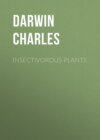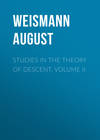Kitabı oku: «Insectivorous Plants», sayfa 11
Eighteen leaves were immersed, each in thirty minims of a solution of one part to 87,500 of water (1 gr. to 200 oz.), so that each received 1/3200 of a grain (.0202 mg.). Fourteen of these were strongly inflected within 2 hrs., and some of them within 15 m.; three out of the eighteen were only slightly affected, having twenty-one, nineteen, and twelve tentacles in- flected; and one was not at all acted on. By an accident only fifteen, instead of eighteen, leaves were immersed at the same time in water; these were observed for 24 hrs.; one had six, another four, and a third two, of their outer tentacles inflected; the remainder being quite unaffected.
The next experiment was tried under very favourable circumstances, for the day (July 8) was very warm, and I happened to have unusually fine leaves. Five were immersed as before in a solution of one part to 131,250 of water (1 gr. to 300 oz.), so that each received 1/4800 of a grain, or .0135 mg. After an immersion of 25 m. all five leaves were much inflected. After 1 hr. 25 m. one leaf had all but eight tentacles inflected; the second, all but three; the third, all but five; the fourth; all but twenty-three; the fifth, on the other hand, never had more than twenty-four inflected. Of the corresponding five leaves in water, one had seven, a second two, a third ten, a fourth one, and a fifth none inflected. Let it be observed what a contrast is presented between these latter leaves and those in the solution. I counted the glands on the second leaf in the solution, and the number was 217; assuming that the three tentacles which did not become inflected absorbed nothing, we find that each of the 214 remaining glands could have absorbed only 1/l027200 of a grain, or .0000631 mg. The third leaf bore 236 glands, and subtracting the five which did not become inflected, each of the remaining 231 glands could have absorbed only 1/1108800 of a grain (or .0000584 mg.), and this amount sufficed to cause the tentacles to bend.
Twelve leaves were tried as before in a solution of one part to 175,000 of water (1 gr. to 400 oz.), so that each leaf received 1/6400 of a grain (.0101 mg.). My plants were not at the time in a good state, and many of the leaves were young and pale. Nevertheless, two of them had all their tentacles, except three or four, closely inflected in under 1 hr. Seven were considerably affected, some within 1 hr., and others not until 3 hrs., 4 hrs. 30 m., and 8 hrs. had elapsed; and this slow action may be attributed to the leaves being young and pale. Of these nine leaves, four had their blades well inflected, and a fifth slightly so. The three remaining leaves were not affected. With respect to the twelve corresponding leaves in water, not one had its blade inflected; after from 1 to 2 hrs. one had thirteen of its outer tentacles inflected; a second six, and four others either one or two inflected. After 8 hrs. the outer tentacles did not become more inflected; whereas this occurred with the leaves in the solution. I record in my notes that after the 8 hrs. it was impossible to compare the two lots, and doubt for an instant the power of the solution.
Two of the above leaves in the solution had all their tentacles, except three and four, inflected within an hour. I counted their glands, and, on the same principle as before, each gland on one leaf could have absorbed only 1/1164800, and on the other leaf only 1/1472000, of a grain of the phosphate.
Twenty leaves were immersed in the usual manner, each in thirty minims of a solution of one part to 218,750 of water (1 gr. to 500 oz.). So many leaves were tried because I was then under the false impression that it was incredible that any weaker solution could produce an effect. Each leaf received 1/8000 of a grain, or .0081 mg. The first eight leaves which I tried both in the solution and in water were either young and pale or too old; and the weather was not hot. They were hardly at all affected; nevertheless, it would be unfair to exclude them. I then waited until I got eight pairs of fine leaves, and the weather was favourable; the temperature of the room where the leaves were immersed varying from 75o to 81o (23o.8 to 27o.2 Cent.) In another trial with four pairs (included in the above twenty pairs), the temperature in my room was rather low, about 60o (15o.5 Cent.); but the plants had been kept for several days in a very warm greenhouse and thus rendered extremely sensitive. Special precautions were taken for this set of experiments; a chemist weighed for me a grain in an excellent balance; and fresh water, given me by Prof. Frankland, was carefully measured. The leaves were selected from a large number of plants in the following manner: the four finest were immersed in water, and the next four finest in the solution, and so on till the twenty pairs were complete. The water specimens were thus a little favoured, but they did not undergo more inflection than in the previous cases, comparatively with those in the solution.
Of the twenty leaves in the solution, eleven became inflected within 40 m.; eight of them plainly and three rather doubtfully; but the latter had at least twenty of their outer tentacles inflected. Owing to the weakness of the solution, inflection occurred, except in No. 1, much more slowly than in the previous trials. The condition of the eleven leaves which were considerably inflected will now be given at stated intervals, always reckoning from the time of immersion: —
(1) After only 8 m. a large number of tentacles inflected, and after 17 m. all but fifteen; after 2 hrs. all but eight in- flected, or plainly sub-inflected. After 4 hrs. the tentacles began to re-expand, and such prompt re-expansion is unusual; after 7 hrs. 30 m. they were almost fully re-expanded.
(2) After 39 m. a large number of tentacles inflected; after 2 hrs. 18 m. all but twenty-five inflected; after 4 hrs. 17 m. all but sixteen inflected. The leaf remained in this state for many hours.
(3) After 12 m. a considerable amount of inflection; after 4 hrs. all the tentacles inflected except those of the two outer rows, and the leaf remained in this state for some time; after 23 hrs. began to re-expand.
(4) After 40 m. much inflection; after 4 hrs. 13 m. fully half the tentacles inflected; after 23 hrs. still slightly inflected.
(5) After 40 m. much inflection; after 4 hrs. 22 m. fully half the tentacles inflected; after 23 hrs. still slightly inflected.
(6) After 40 m. some inflection; after 2 hrs. 18 m. about twenty-eight outer tentacles inflected; after 5 hrs. 20 m. about a third of the tentacles inflected; after 8 hrs. much re-expanded.
(7) After 20 m. some inflection; after 2 hrs. a considerable number of tentacles inflected; after 7 hrs. 45 m. began to re-expand.
(8) After 38 m. twenty-eight tentacles inflected; after 3 hrs. 45 m. thirty-three inflected, with most of the submarginal tentacles sub-inflected; continued so for two days, and then partially re-expanded.
(9) After 38 m. forty-two tentacles inflected; after 3 hrs. 12 m. sixty-six inflected or sub-inflected; after 6 hrs. 40 m. all but twenty-four inflected or sub-inflected; after 9 hrs. 40 m. all but seventeen inflected; after 24 hrs. all but four inflected or sub-inflected, only a few being closely inflected; after 27 hrs. 40 m. the blade inflected. The leaf remained in this state for two days, and then began to re-expand.
(10) After 38 m. twenty-one tentacles inflected; after 3 hrs. 12 m. forty-six tentacles inflected or sub-inflected; after 6 hrs. 40 m. all but seventeen inflected, though none closely; after 24 hrs. every tentacle slightly curved inwards; after 27 hrs. 40 m. blade strongly inflected, and so continued for two days, and then the tentacles and blade very slowly re-expanded.
(11) This fine dark red and rather old leaf, though not very large, bore an extraordinary number of tentacles (viz. 252), and behaved in an anomalous manner. After 6 hrs. 40 m. only the short tentacles round the outer part of the disc were inflected, forming a ring, as so often occurs in from 8 to 24 hrs. With leaves both in water and the weaker solutions. But after 9 hrs. 40 m. all the outer tentacles except twenty-five were inflected; as was the blade in a strongly marked manner. After 24 hrs. every tentacle except one was closely inflected, and the blade was completely doubled over. Thus the leaf remained for two days, when it began to re-expand. I may add that the three latter leaves (Nos. 9, 10, and 11) were still somewhat inflected after three days. The tentacles in but few of these eleven leaves became closelyinflected within so short a time as in the previous experiments with stronger solutions.
We will now turn to the twenty corresponding leaves in water. Nine had none of their outer tentacles inflected; nine others had from one to three inflected; and these re-expanded after 8 hrs. The remaining two leaves were moderately affected; one having six tentacles inflected in 34 m.; the other twenty-three inflected in 2 hrs. 12 m.; and both thus remained for 24 hrs. None of these leaves had their blades inflected. So that the contrast between the twenty leaves in water and the twenty in the solution was very great, both within the first hour and after from 8 to 12 hrs. had elapsed.
Of the leaves in the solution, the glands on leaf No. 1, which in 2 hrs. had all its tentacles except eight inflected, were counted and found to be 202. Subtracting the eight, each gland could have received only the 1/1552000 grain (.0000411 mg.) of the phosphate. Leaf No. 9 had 213 tentacles, all of which, with the exception of four, were inflected after 24 hrs., but none of them closely; the blade was also inflected; each gland could have received only the 1/1672000 of a grain, or .0000387 mg. Lastly, leaf No. 11, which had after 24 hrs. all its tentacles, except one, closely inflected, as well as the blade, bore the unusually large number of 252 tentacles; and on the same principle as before, each gland could have absorbed only the 1/2008000 of a grain, or .0000322 mg.
With respect to the following experiments, I must premise that the leaves, both those placed in the solutions and in water, were taken from plants which had been kept in a very warm greenhouse during the winter. They were thus rendered extremely sensitive, as was shown by water exciting them much more than in the previous experiments. Before giving my observations, it may be well to remind the reader that, judging from thirty-one fine leaves, the average number of tentacles is 192, and that the outer or exterior ones, the movements of which are alone significant, are to the short ones on the disc in the proportion of about sixteen to nine.
Four leaves were immersed as before, each in thirty minims of a solution of one part to 328,125 of water (1 gr. to 750 oz.). Each leaf thus received 1/12000 of a grain (.0054 mg.) of the salt; and all four were greatly inflected.
(1) After 1 hr. all the outer tentacles but one inflected, and the blade greatly so; after 7 hrs. began to re-expand.
(2) After 1 hr. all the outer tentacles but eight inflected; after 12 hrs. all re-expanded.
(3) After 1 hr. much inflection; after 2 hrs. 30 m. all the tentacles but thirty-six inflected; after 6 hrs. all but twenty-two inflected; after 12 hrs. partly re-expanded.
(4) After 1 hr. all the tentacles but thirty-two inflected; after 2 hrs. 30 m. all but twenty-one inflected; after 6 hrs. almost re-expanded.
Of the four corresponding leaves in water: —
(1) After 1 hr. forty-five tentacles inflected; but after 7 hrs. so many had re-expanded that only ten remained much inflected.
(2) After 1 hr. seven tentacles inflected; these were almost re-expanded in 6 hrs.
(3) and (4) Not affected, except that, as usual, after 11 hrs. the short tentacles on the borders of the disc formed a ring.
There can, therefore, be no doubt about the efficiency of the above solution; and it follows as before that each gland of No. 1 could have absorbed only 1/2412000 of a grain (.0000268 mg.) and of No. 2 only 1/2460000 of a grain (.0000263 mg.) of the phosphate.
Seven leaves were immersed, each in thirty minims of a solution of one part to 437,500 of water (1 gr. to 1000 oz.). Each leaf thus received 1/16000 of a grain (.00405 mg.). The day was warm, and the leaves were very fine, so that all circumstances were favourable.
(1) After 30 m. all the outer tentacles except five inflected, and most of them closely; after 1 hr. blade slightly inflected; after 9 hrs. 30 m. began to re-expand.
(2) After 33 m. all the outer tentacles but twenty-five inflected, and blade slightly so; after 1 hr. 30 m. blade strongly inflected and remained so for 24 hrs.; but some of the tentacles had then re-expanded.
(3) After 1 hr. all but twelve tentacles inflected; after 2 hrs. 30 m. all but nine inflected; and of the inflected tentacles all excepting four closely; blade slightly inflected. After 8 hrs. blade quite doubled up, and now all the tentacles excepting eight closely inflected. The leaf remained in this state for two days.
(4) After 2 hrs. 20 m. only fifty-nine tentacles inflected; but after 5 hrs. all the tentacles closely inflected excepting two which were not affected, and eleven which were only sub-inflected; after 7 hrs. blade considerably inflected; after 12 hrs. much re-expansion.
(5) After 4 hrs. all the tentacles but fourteen inflected; after 9 hrs. 30 m. beginning to re-expand.
(6) After 1 hr. thirty-six tentacles inflected; after 5 hrs. all but fifty-four inflected; after 12 hrs. considerable re-expansion.
(7) After 4 hrs. 30 m. only thirty-five tentacles inflected or sub-inflected, and this small amount of inflection never increased.
Now for the seven corresponding leaves in water: —
(1) After 4 hrs. thirty-eight tentacles inflected; but after 7 hrs. these, with the exception of six, re-expanded.
(2) After 4 hrs. 20 m. twenty inflected; these after 9 hrs. partially re-expanded.
(3) After 4 hrs. five inflected, which began to re-expand after 7 hrs.
(4) After 24 hrs. one inflected.
(5), (6) and (7) Not at all affected, though observed for 24 hrs., excepting the short tentacles on the borders of the disc, which as usual formed a ring.
A comparison of the leaves in the solution, especially of the first five or even six on the list, with those in the water, after 1 hr. or after 4 hrs., and in a still more marked degree after 7 hrs. or 8 hrs., could not leave the least doubt that the solution had produced a great effect. This was shown not only by the vastly greater number of inflected tentacles, but by the degree or closeness of their inflection, and by that of their blades. Yet each gland on leaf No. 1 (which bore 255 glands, all of which, excepting five, were inflected in 30 m.) could not have received more than one-four-millionth of a grain (.0000162 mg.) of the salt. Again, each gland on leaf No. 3 (which bore 233 glands, all of which, except nine, were inflected in 2 hrs. 30 m.) could have received at most only the 1/3584000 of a grain, or .0000181 mg.
Four leaves were immersed as before in a solution of one part to 656,250 of water (1 gr. to 1500 oz.); but on this occasion I happened to select leaves which were very little sensitive, as on other occasions I chanced to select unusually sensitive leaves. The leaves were not more affected after 12 hrs. than the four corresponding ones in water; but after 24 hrs. they were slightly more inflected. Such evidence, however, is not at all trustworthy.
Twelve leaves were immersed, each in thirty minims of a solution of one part to 1,312,500 of water (1 gr. to 3000 oz.); so that each leaf received 1/48000 of a grain (.00135 mg.). The leaves were not in very good condition; four of them were too old and of a dark red colour; four were too pale, yet one of these latter acted well; the four others, as far as could be told by the eye, seemed in excellent condition. The result was as follows: —
(1) This was a pale leaf; after 40 m. about thirty-eight tentacles inflected; after 3 hrs. 30 m. the blade and many of the outer tentacles inflected; after 10 hrs. 15 m. all the tentacles but seventeen inflected, and the blade quite doubled up; after 24 hrs. all the tentacles but ten more or less inflected. Most of them were closely inflected, but twenty-five were only sub-inflected.
(2) After 1 hr. 40 m. twenty-five tentacles inflected; after 6 hrs. all but twenty-one inflected; after 10 hrs. all but sixteen more or less inflected; after 24 hrs. re-expanded.
(3) After 1 hr. 40 m. thirty-five inflected; after 6 hrs. "a large number" (to quote my own memorandum) inflected, but from want of time they were not counted; after 24 hrs. re-expanded.
(4) After 1 hr. 40 m. about thirty inflected; after 6 hrs. "a large number all round the leaf" inflected, but they were not counted; after 10 hrs. began to re-expand.
(5) to (12) These were not more inflected than leaves often are in water, having respectively 16, 8, 10, 8, 4, 9, 14, and 0 tentacles inflected. Two of these leaves, however, were remarkable from having their blades slightly inflected after 6 hrs.
With respect to the twelve corresponding leaves in water, (1) had, after 1 hr. 35 m., fifty tentacles inflected, but after 11 hrs. only twenty-two remained so, and these formed a group, with the blade at this point slightly inflected. It appeared as if this leaf had been in some manner accidentally excited, for instance by a particle of animal matter which was dissolved by the water. (2) After 1 hr. 45 m. thirty-two tentacles inflected, but after 5 hrs. 30 m. only twenty-five inflected, and these after 10 hrs. all re-expanded; (3) after 1 hr. twenty-five inflected, which after 10 hrs. 20 m. were all re-expanded; (4) and (5) after 1 hr. 35 m. six and seven tentacles inflected, which re-expanded after 11 hrs.; (6), (7) and (8) from one to three inflected, which soon re-expanded; (9), (10), (11) and (12) none inflected, though observed for twenty-four hours.
Comparing the states of the twelve leaves in water with those in the solution, there could be no doubt that in the latter a larger number of tentacles were inflected, and these to a greater degree; but the evidence was by no means so clear as in the former experiments with stronger solutions. It deserves attention that the inflection of four of the leaves in the solution went on increasing during the first 6 hrs., and with some of them for a longer time; whereas in the water the inflection of the three leaves which were the most affected, as well as of all the others, began to decrease during this same interval. It is also remarkable that the blades of three of the leaves in the solution were slightly inflected, and this is a most rare event with leaves in water, though it occurred to a slight extent in one (No. 1), which seemed to have been in some manner accidentally excited. All this shows that the solution produced some effect, though less and at a much slower rate than in the previous cases. The small effect produced may, however, be accounted for in large part by the majority of the leaves having been in a poor condition.
Of the leaves in the solution, No. 1 bore 200 glands and received 1/48000 of a grain of the salt. Subtracting the seventeen tentacles which were not inflected, each gland could have absorbed only the 1/8784000 of a grain (.00000738 mg.). This amount caused the tentacle bearing each gland to be greatly inflected. The blade was also inflected.
Lastly, eight leaves were immersed, each in thirty minims of a solution of one part of the phosphate to 21,875,000 of water (1 gr. to 5000 oz.). Each leaf thus received 1/80000 of a grain of the salt, or .00081 mg. I took especial pains in selecting the finest leaves from the hot-house for immersion, both in the solution and the water, and almost all proved extremely sensitive. Beginning as before with those in the solution: —
(1) After 2 hrs. 30 m. all the tentacles but twenty-two inflected, but some only sub-inflected; the blade much inflected; after 6 hrs. 30 m. all but thirteen inflected, with the blade immensely inflected; and remained so for 48 hrs.
(2) No change for the first 12 hrs., but after 24 hrs. all the tentacles inflected, excepting those of the outermost row, of which only eleven were inflected. The inflection continued to increase, and after 48 hrs. all the tentacles except three were inflected, and most of them rather closely, four or five being only sub-inflected.
(3) No change for the first 12 hrs.; but after 24 hrs. all the tentacles excepting those of the outermost row were sub-inflected, with the blade inflected. After 36 hrs. blade strongly inflected, with all the tentacles, except three, inflected or sub-inflected. After 48 hrs. in the same state.
(4) to (8) These leaves, after 2 hrs. 30 m., had respectively 32, 17, 7, 4, and 0 tentacles inflected, most of which, after a few hours, re-expanded, with the exception of No. 4, which retained its thirty-two tentacles inflected for 48 hrs.
Now for the eight corresponding leaves in water: —
(1) After 2 hrs. 40 m. this had twenty of its outer tentacles inflected, five of which re-expanded after 6 hrs. 30 m. After 10 hrs. 15 m. a most unusual circumstance occurred, namely, the whole blade became slightly bowed towards the footstalk, and so remained for 48 hrs. The exterior tentacles, excepting those of the three or four outermost rows, were now also inflected to an unusual degree.
(2) to (8) These leaves, after 2 hrs. 40 m., had respectively 42, 12, 9, 8, 2, 1, and 0 tentacles inflected, which all re-expanded within 24 hrs., and most of them within a much shorter time.
When the two lots of eight leaves in the solution and in the water were compared after the lapse of 24 hrs., they undoubtedly differed much in appearance. The few tentacles on the leaves in water which were inflected had after this interval re-expanded, with the exception of one leaf; and this presented the very unusual case of the blade being somewhat inflected, though in a degree hardly approaching that of the two leaves in the solution. Of these latter leaves, No. 1 had almost all its tentacles, together with its blade, inflected after an immersion of 2 hrs. 30 m. Leaves No. 2 and 3 were affected at a much slower rate; but after from 24 hrs. to 48 hrs. almost all their tentacles were closely inflected, and the blade of one quite doubled up. We must therefore admit, incredible as the fact may at first appear, that this extremely weak solution acted on the more sensitive leaves; each of which received only the 1/80000 of a grain (.00081 mg.) of the phosphate. Now, leaf No. 3 bore 178 tentacles, and subtracting the three which were not inflected, each gland could have absorbed only the 1/14000000 of a grain, or .00000463 mg. Leaf No. 1, which was strongly acted on within 2 hrs. 30 m., and had all its outer tentacles, except thirteen, inflected within 6 hrs. 30 m., bore 260 tentacles; and on the same principle as before, each gland could have absorbed only 1/19760000 of a grain, or .00000328 mg.; and this excessively minute amount sufficed to cause all the tentacles bearing these glands to be greatly inflected. The blade was also inflected.]
Summary of the Results with Phosphate of Ammonia. – The glands of the disc, when excited by a half-minim drop (.0296 ml.), containing 1/3840 of a grain (.0169 mg.) of this salt, transmit a motor impulse to the exterior tentacles, causing them to bend inwards. A minute drop, containing 1/153600 of a grain (.000423 mg.), if held for a few seconds in contact with a gland, causes the tentacle bearing this gland to be inflected. If a leaf is left immersed for a few hours, and sometimes for a shorter time, in a solution so weak that each gland can absorb only the 1/9760000 of a grain (.00000328 mg.), this is enough to excite the tentacle into movement, so that it becomes closely inflected, as does sometimes the blade. In the general summary to this chapter a few remarks will be added, showing that the efficiency of such extremely minute doses is not so incredible as it must at first appear.
[Sulphate of Ammonia. – The few trials made with this and the following five salts of ammonia were undertaken merely to ascertain whether they induced inflection. Half-minims of a solution of one part of the sulphate of ammonia to 437 of water were placed on the discs of seven leaves, so that each received 1/960 of a grain, or .0675 mg. After 1 hr. the tentacles of five of them, as well as the blade of one, were strongly inflected. The leaves were not afterwards observed.
Citrate of Ammonia. – Half-minims of a solution of one part to 437 of water were placed on the discs of six leaves. In 1 hr. the short outer tentacles round the discs were a little inflected, with the glands on the discs blackened. After 3 hrs. 25 m. one leaf had its blade inflected, but none of the exterior tentacles. All six leaves remained in nearly the same state during the day, the submarginal tentacles, however, becoming more inflected. After 23 hrs. three of the leaves had their blades somewhat inflected; and the submarginal tentacles of all considerably inflected, but in none were the two, three, or four outer rows affected. I have rarely seen cases like this, except from the action of a decoction of grass. The glands on the discs of the above leaves, instead of being almost black, as after the first hour, were now after 23 hrs. very pale. I next tried on four leaves half-minims of a weaker solution, of one part to 1312 of water (1 gr. to 3 oz.); so that each received 1/2880 of a grain (.0225 mg.). After 2 hrs. 18 m. the glands on the disc were very dark-coloured; after 24 hrs. two of the leaves were slightly affected; the other two not at all.
Acetate of Ammonia. – Half-minims of a solution of about one part to 109 of water were placed on the discs of two leaves, both of which were acted on in 5 hrs. 30 m., and after 23 hrs. had every single tentacle closely inflected.
Oxalate of Ammonia. – Half-minims of a solution of one part to 218 of water were placed on two leaves, which, after 7 hrs., became moderately, and after 23 hrs. strongly, inflected. Two other leaves were tried with a weaker solution of one part to 437 of water; one was strongly inflected in 7 hrs.; the other not until 30 hrs. had elapsed.
Tartrate of Ammonia. – Half-minims of a solution of one part to 437 of water were placed on the discs of five leaves. In 31 m. there was a trace of inflection in the exterior tentacles of some of the leaves, and this became more decided after 1 hr. with all the leaves; but the tentacles were never closely inflected. After 8 hrs. 30 m. they began to re-expand. Next morning, after 23 hrs., all were fully re-expanded, excepting one which was still slightly inflected. The shortness of the period of inflection in this and the following case is remarkable.
Chloride of Ammonium. – Half-minims of a solution of one part to 437 of water were placed on the discs of six leaves. A decided degree of inflection in the outer and submarginal tentacles was perceptible in 25 m.; and this increased during the next three or four hours, but never became strongly marked. After only 8 hrs. 30 m. the tentacles began to re-expand, and by the next morning, after 24 hrs., were fully re-expanded on four of the leaves, but still slightly inflected on two.]
General Summary and Concluding Remarks on the Salts of Ammonia. – We have now seen that the nine salts of ammonia which were tried, all cause the inflection of the tentacles, and often of the blade of the leaf. As far as can be ascertained from the superficial trials with the last six salts, the citrate is the least powerful, and the phosphate certainly by far the most. The tartrate and chloride are remarkable from the short duration of their action. The relative efficiency of the carbonate, nitrate, and phosphate, is shown in the following table by the smallest amount which suffices to cause the inflection of the tentacles.
Column 1: Solutions, how applied. Column 2: Carbonate of Ammonia.
Column 3: Nitrate of Ammonia. Column 4: Phosphate of Ammonia.
Placed on the glands of the disc, so as to act indirectly on the outer tentacles: 1/960 of a grain, or 0675 mg.: 1/2400 of a grain, or .027 mg.: 1/3840 of a grain, or .0169 mg.
Applied for a few seconds directly to the gland of an outer tentacle: 1/14400 of a grain, or .00445 mg.: 1/28800 of a grain, or .0025 mg. grain, 1/153600 of a grain, or .000423 mg.
Leaf immersed, with time allowed for each gland to absorb all that it can: 1/268800 of a grain, or .00024 mg.: 1/691200 of a grain, or .0000937 mg.: 1/19760000 of a grain, or .00000328 mg.
Amount absorbed by a gland which suffices to cause the aggregation of the protoplasm in the adjoining cells of the tentacles. 1/134400 of a grain, or .00048 mg.
From the experiments tried in these three different ways, we see that the carbonate, which contains 23.7 per cent. of nitrogen, is less efficient than the nitrate, which contains 35 per cent. The phosphate contains less nitrogen than either of these salts, namely, only 21.2 per cent., and yet is far more efficient; its power no doubt depending quite as much on the phosphorus as on the nitrogen which it contains. We may infer that this is the case, from the energetic manner in which bits of bone and phosphate of lime affect the leaves. The inflection excited by the other salts of ammonia is probably due solely to their nitrogen, – on the same principle that nitrogenous organic fluids act powerfully, whilst non-nitrogenous organic fluids are powerless. As such minute doses of the salts of ammonia affect the leaves, we may feel almost sure that Drosera absorbs and profits by the amount, though small, which is present in rain-water, in the same manner as other plants absorb these same salts by their roots.
The smallness of the doses of the nitrate, and more especially of the phosphate of ammonia, which cause the tentacles of immersed leaves to be inflected, is perhaps the most remarkable fact recorded in this volume. When we see that much less than the millionth35 of a grain of the phosphate, absorbed by a gland of one of the exterior tentacles, causes it to bend, it may be thought that the effects of the solution on the glands of the disc have been overlooked; namely, the transmission of a motor impulse from them to the exterior tentacles. No doubt the movements of the latter are thus aided; but the aid thus rendered must be insignificant; for we know that a drop containing as much as the 1/3840 of a grain placed on the disc is only just able to cause the outer tentacles of a highly sensitive leaf to bend. It is certainly a most surprising fact that the 1/19760000 of a grain, or in round numbers the one-twenty-millionth of a grain (.0000033 mg.), of the phosphate should affect any plant, or indeed any animal; and as this salt contains 35.33 per cent. of water of crystallisation, the efficient elements are reduced to 1/30555126 of a grain, or in round numbers to one-thirty-millionth of a grain (.00000216 mg.). The solution, moreover, in these experiments was diluted in the proportion of one part of the salt to 2,187,500 of water, or one grain to 5000 oz. The reader will perhaps best realise this degree of dilution by remembering that 5000 oz. would more than fill a 31-gallon cask; and that to this large body of water one grain of the salt was added; only half a drachm, or thirty minims, of the solution being poured over a leaf. Yet this amount sufficed to cause the inflection of almost every tentacle, and often of the blade of the leaf.









